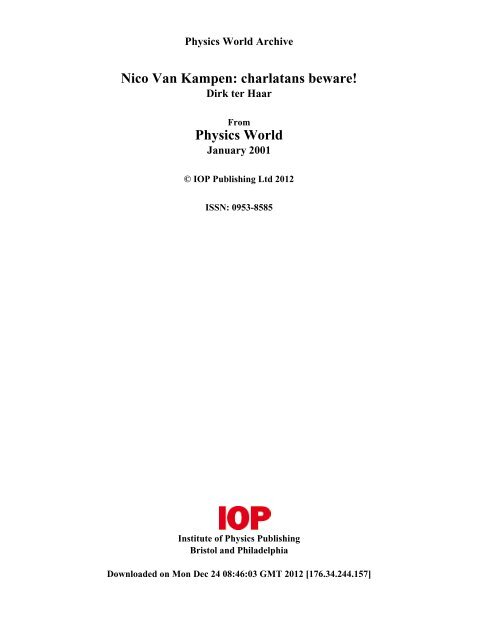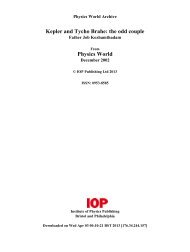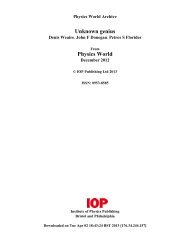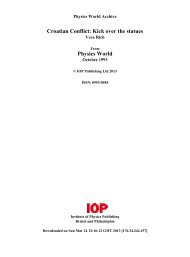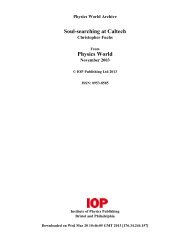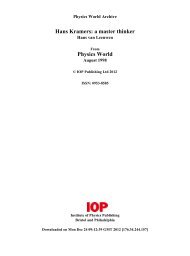Nico Van Kampen: charlatans beware! Physics World - Institute of ...
Nico Van Kampen: charlatans beware! Physics World - Institute of ...
Nico Van Kampen: charlatans beware! Physics World - Institute of ...
Create successful ePaper yourself
Turn your PDF publications into a flip-book with our unique Google optimized e-Paper software.
<strong>Physics</strong> <strong>World</strong> Archive<br />
<strong>Nico</strong> <strong>Van</strong> <strong>Kampen</strong>: <strong>charlatans</strong> <strong>beware</strong>!<br />
Dirk ter Haar<br />
From<br />
<strong>Physics</strong> <strong>World</strong><br />
January 2001<br />
© IOP Publishing Ltd 2012<br />
ISSN: 0953-8585<br />
<strong>Institute</strong> <strong>of</strong> <strong>Physics</strong> Publishing<br />
Bristol and Philadelphia<br />
Downloaded on Mon Dec 24 08:46:03 GMT 2012 [176.34.244.157]
REVIEWS<br />
DirkterHaar<br />
<strong>Nico</strong> van <strong>Kampen</strong>: <strong>charlatans</strong> <strong>beware</strong>!<br />
Views <strong>of</strong> a Physicist Selected Papers <strong>of</strong><br />
NG van <strong>Kampen</strong><br />
<strong>Nico</strong> van <strong>Kampen</strong> is one <strong>of</strong> the most outstanding<br />
theoretical physicists <strong>of</strong> the second<br />
half <strong>of</strong> the 20th century. He is very much<br />
a theorist's theorist and most physicists do<br />
not know him well. There is therefore a danger<br />
- as was the case with his teacher Hans<br />
Kramers - that his name may slide into<br />
oblivion for lack <strong>of</strong> a single eye-catching<br />
achievement. In Kramers' case, it was felt<br />
that this fate could be avoided by publishing<br />
a collection <strong>of</strong> his scientific papers (see<br />
"Hans Kramers: a master thinker" <strong>Physics</strong><br />
<strong>World</strong> August 1998 pp55-56).<br />
The editor <strong>of</strong> the present book, Paul<br />
Meijer, also decided that a collection <strong>of</strong> some<br />
<strong>of</strong> van <strong>Kampen</strong>'s papers would be a suitable<br />
way <strong>of</strong> introducing him to the general physicist.<br />
For those <strong>of</strong> us who know van <strong>Kampen</strong>,<br />
his attitude to physics, as he approaches it<br />
these days, certainly shines through in these<br />
papers, which include invited lectures, speeches,<br />
popular-science writing, obituaries and<br />
book reviews. As his former pupil, the 1999<br />
Nobel-prize winner Gerard 't Ho<strong>of</strong>t, writes<br />
in the prologue: "Here comes van <strong>Kampen</strong><br />
to show up the <strong>charlatans</strong>." I strongly recom-<br />
Powerful thoughts - <strong>Nico</strong> van <strong>Kampen</strong> does not like<br />
sloppy or dishonest thinkingin physics<br />
struggling to understand the enigmas <strong>of</strong> nature<br />
- rather than struggling to obtain funds.<br />
And <strong>of</strong> course computers were not there to<br />
distract you from real physics". Some <strong>of</strong> the<br />
shortcomings <strong>of</strong> today's science are shown<br />
up in the papers entitled "The danger <strong>of</strong> science<br />
management" and "Bibliometry — is it<br />
a Science?"<br />
The second main theme that emerges is<br />
"<strong>Van</strong> <strong>Kampen</strong>'s papers<br />
have to be read carefully."<br />
mend this selection <strong>of</strong> papers, which sheds<br />
a strong illuminating light on present-day<br />
physics — warts and all.<br />
<strong>Van</strong> <strong>Kampen</strong>'s papers have to be read<br />
carefully because some <strong>of</strong> the more important<br />
lessons to be learned from them follow<br />
from sentences that are more or less<br />
thrown away. For instance, in a paper entitled<br />
"From statistical mechanics to quantum<br />
mechanics", the introductory paragraph<br />
ends with the following: "My concern is<br />
therefore a purely intellectual satisfaction. It<br />
is <strong>of</strong> little concern for those who are contaminated<br />
by the fashionable market thinking,<br />
I mean the view that science has no<br />
other purpose than to increase pr<strong>of</strong>its. The<br />
only defence against this mindless commercialism<br />
is the scientific researcher's unbridled<br />
urge to understanding."<br />
There are some powerful lines <strong>of</strong> thought<br />
running through many <strong>of</strong> these papers. First,<br />
one gets a feeling <strong>of</strong> nostalgia for science as it<br />
was in the days when, as van <strong>Kampen</strong> puts it,<br />
"working (on a scientific subject) still meant<br />
van <strong>Kampen</strong>'s criticism <strong>of</strong> what he calls<br />
"Postmodern obscurantism". He is especially<br />
critical <strong>of</strong> those scientists who try to<br />
cloak quantum mechanics in some kind <strong>of</strong><br />
mysticism. "John Bell, Roger Penrose and<br />
others writing for the general public do a<br />
disservice to science by clothing quantum<br />
mechanics in a mystical aura," argues van<br />
<strong>Kampen</strong>. "It is a perfectly logical, coherent<br />
physical theory, which can be understood<br />
rationally. The mysticism is theirs."<br />
Third, we have van <strong>Kampen</strong>'s attack on<br />
the sloppiness and dishonesty <strong>of</strong> many <strong>of</strong><br />
the most fashionable theories. For example,<br />
he has the following to say about renormalization<br />
theory: "It starts from a basic question<br />
that is mathematically meaningless;<br />
one which then expands formally in powers<br />
<strong>of</strong> some interaction constant and obtains a<br />
series, which not only diverges but whose<br />
terms are each given by a divergent integral.<br />
One then resorts to a collection <strong>of</strong> ad<br />
hoc recipes in order to extract from this<br />
mess finite numbers that can be compared<br />
with experiment."<br />
<strong>Van</strong> <strong>Kampen</strong> also criticizes the approach<br />
that physicists <strong>of</strong>ten take in statistical mechanics<br />
when making the transition from a<br />
microscopic description to one that can be<br />
compared with macroscopic phenomena.<br />
"One cheats a bit," he writes. "One averages<br />
the result obtained for a short time interval,<br />
and computes afresh the average over the<br />
next short time interval. And so on. That<br />
implies the drastic assumption that the intermediate<br />
averaging does not affect the result.<br />
For lack <strong>of</strong> justification <strong>of</strong> this assumption<br />
one has thought up many names for it.. .Also<br />
numerous attempts have appeared in die<br />
literature in which this assumption is carefully<br />
hidden. Such an attempt may produce<br />
a certain fame for the author, but for the<br />
health <strong>of</strong> physics it is better to formulate<br />
openly the difficulty."<br />
Most <strong>of</strong> the papers in this collection were<br />
chosen because they would otherwise be<br />
hard to obtain, <strong>of</strong>ten because they were<br />
originally written in Dutch. As Meijer puts<br />
it: "It is unlikely that there will be many<br />
more Maxwells, who undertook the double<br />
to learn Dutch solely to get acquainted with<br />
the thesis <strong>of</strong> van der Waals." It is interesting<br />
to note that two centuries earlier Hooke<br />
had done the same in order to read van<br />
Leeuwenhoek's communications to the<br />
Royal Society.<br />
I have only one small criticism <strong>of</strong> the<br />
book. As the publishers, <strong>World</strong> Scientific,<br />
were willing to publish more that 900 pages<br />
<strong>of</strong> papers by John Bell, they should have<br />
been willing to add a hundred or so pages<br />
to the present volume to include some <strong>of</strong><br />
van <strong>Kampen</strong>'s technical papers. After all,<br />
his PhD thesis, which gives the final development<br />
<strong>of</strong> Kramer's ideas about renormalization,<br />
is published in the Proceedings <strong>of</strong> the<br />
Danish Academy, while his fundamental<br />
attack on linear response theory is his contribution<br />
to a Festschrift for Harald Wergcland,<br />
published in Physica Norvegica. These<br />
two papers are not easily accessible yet they<br />
both show van <strong>Kampen</strong> at his best. Another<br />
technical paper that I wish had been included<br />
is the one in which the van <strong>Kampen</strong><br />
modes — cousins <strong>of</strong> Landau damping -<br />
are introduced.<br />
Finally, the value <strong>of</strong> this volume would<br />
have been greatly enhanced if it had included<br />
a list <strong>of</strong> van <strong>Kampen</strong>'s publications -<br />
if only to acquaint the reader with the multifaceted<br />
interests <strong>of</strong> this exceptional physicist<br />
Dirk ter Haar i|s an emeritus fellow <strong>of</strong> Magdalen<br />
College, Oxford, UK. He is the author <strong>of</strong> Master <strong>of</strong><br />
Modern <strong>Physics</strong>: The Scientific Contributions <strong>of</strong><br />
HA Kramers (1998 Princeton University Press)<br />
46 PHY»IC» WOULD UNU«»Y 2001


